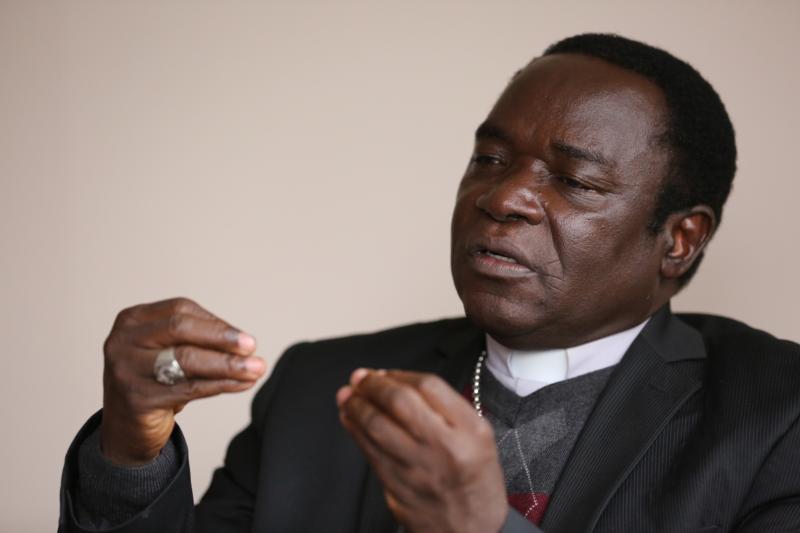The Nigerian bishop says that Africa must stop blaming the West for its problems

YAOUNDÉ, Cameroon - Following a June 10 report by the Norwegian Refugee Council (NRC) that nine of the ten "most neglected displacement crises in the world" were found in Africa, a Nigerian bishop warns against accusing the West for the situation.
"Accusing the West of abandoning Africa poses the question, but it affects the heart of our problem in Africa, our expectations that we will continue to be on the knees of western nations so that the rest of our lives will be caressed and nourished even when we refuse to grow or maybe pampering made it impossible for us to grow, "said Bishop Matthew Kukah of Sokoto.
“How can the West be accused of negligence when it is at the center of wars in Africa? You're asking the accused to become the defendant, "Kukah.
The bishop spoke to Crux after the publication of the NRC report, which highlighted several areas of concern on the African continent.
Cameroon - which is facing the triple threat of a separatist revolt in western English-speaking regions, an uprising of Boko Haram in the north and an influx of Central African refugees to the east - tops the list. The Democratic Republic of the Congo, Burkina Faso, Burundi, Mali, South Sudan, Nigeria, the Central African Republic and Niger also made the cut. Venezuela is the only non-African country on the list.
Jan Egeland, secretary general of the Norwegian Refugee Council (NRC), said that "the profound crises represented by millions of displaced people from Africa are once again the most underfunded, ignored and depreciated by the world".
“They are plagued by diplomatic and political paralysis, weak aid operations and poor media attention. Despite facing a tornado of emergencies, their SOS asks for help not to hear, "he continued.
The report says that the crises in these countries are expected to worsen in 2020, a situation that will be exacerbated by the global coronavirus pandemic.
“COVID-19 is spreading across Africa and many of the most neglected communities are already devastated by the economic shocks of the pandemic. We need solidarity with these conflict-affected communities now more than ever, so the virus doesn't add more unbearable disaster to the myriad of crises they already face, "said Egeland.
While the report blames donors for prioritizing crises, probably because they don't fit into their geopolitical map, Kukah blames continent's woes for African leaders who are generally ill-prepared to deal with the problems.
“I think we should ask ourselves why our leaders have been so negligent in failing to develop solid internal mechanisms to protect their people and build strong institutions and nations. Africa has had enough of the tragedies of too many ill-prepared people who have gained power, with a limited understanding of how the world works and of the so-called leaders who have continued to take care of the interests of the west at the expense of their people just to the crumbs on which they and their families feed, “said the bishop to Crux.
"So, I think it's wrong first of all to accuse the West of neglecting African crises, especially when some of these crises are caused by the greed of African leaders who continue to turn their countries into personal fiefdoms," he said.
Focusing on Nigeria, Kukah said the nation's wealth was "exploited by the elite and became funnels for black funds."
He questioned the sincerity of Nigerian President Muhammadu Buhari in fighting one of Nigeria's most tenuous conflicts: the war against Boko Haram, which has lasted for more than a decade in the north-east of the country and has caused over 20.000 victims and left over 7 millions of people in need of humanitarian assistance.
The over 200 million Nigerian people are almost equally divided between Christians and Muslims, with the predominant Christians in the south and Muslims in the north. Several Muslim-majority states have implemented sharia, despite the nation's secular constitution.
The current president is a devout Muslim and many of his critics have accused him of favoring his co-religionists.
"Except for the president and his team, nobody can explain where we are and where we are going," said the bishop.
He stressed the fact that today, instead of keeping Boko Haram in check, "brigandage, kidnapping and other forms of violence are now consuming all the northern states as we speak."
"Just two weeks ago, 74 people were massacred and their villages destroyed in the state of Sokoto, the heart of the old caliphate," said Kukah, referring to the Islamic kingdom that once ruled the area.
He also said that no Christian seems to be involved in the decision-making apparatus for the defense of the country.
"For example, today, Nigerians have asked for contradictions in security operations in Nigeria: a conflict born of a Muslim group fighting to make Nigeria an Islamic state is fought by a government led by a Muslim and a Nordic as president, with defense ministers, national security adviser, immigration chief, customs inspector, state security director, police inspector general, army chief and air personnel all Muslims and the northerners, "he stressed.
“The rest of us are all spectators. And, while entire communities have been destroyed and internally displaced people face hundreds of thousands, today Nigerians continue to ask how the president would supervise and approve the construction of two universities in the homes of the army chief and naval personnel? So does it make sense to accuse the international community? What are you accusing them of? Kukah asked.
The bishop said that the consequences of such an outspoken policy led to the "destabilization of the country".